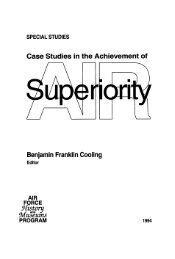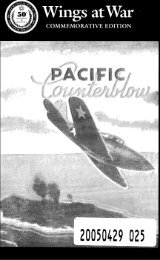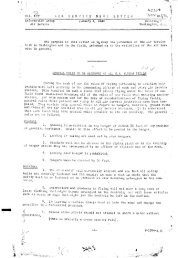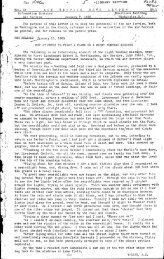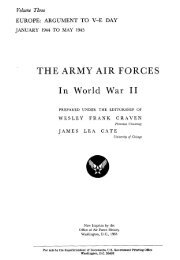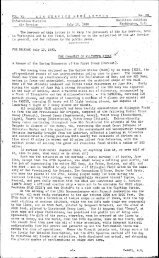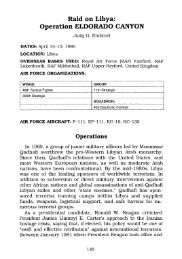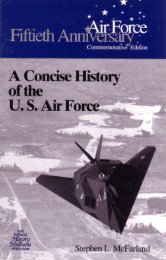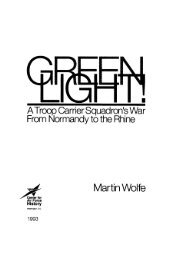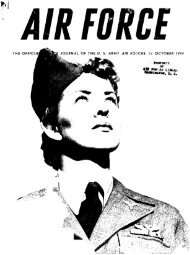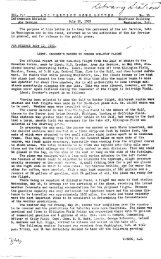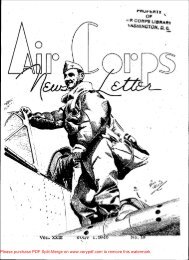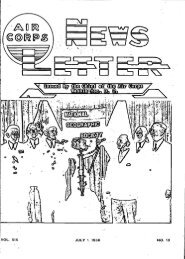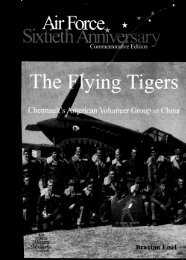News Letter 1941 Jul-Dec - Air Force Historical Studies Office
News Letter 1941 Jul-Dec - Air Force Historical Studies Office
News Letter 1941 Jul-Dec - Air Force Historical Studies Office
You also want an ePaper? Increase the reach of your titles
YUMPU automatically turns print PDFs into web optimized ePapers that Google loves.
CABBAGE AND X-C DON'T<br />
MIX<br />
World War I pilots who quieted their nerves<br />
at the end of particularly hazardous flights<br />
by rushing to the village estaminet and gulping<br />
.huge glesses. of whiskey (a device not<br />
considered sound practice for the pilot~ of<br />
the high-speed aircraft of World War II) had<br />
an excellent chance of becoming chronic alcoholics.<br />
In fact, two of the Medical Corps' best<br />
known flight surgeons write in a new book,<br />
"flying is a hazardous and exh.e.ustingoccupation,<br />
bu.tthe pilot will be wise who learns<br />
to 'taKe it' without recourse to alcohol as<br />
a benumbing drug ••••••military aviation in<br />
our time requires both physical and moral<br />
hardihood of the highest degree. Theneurotic<br />
weakling, seeking escape from stress, or<br />
the chronic alcoholic have no place in avi~<br />
tion."<br />
The authors moe Lieut. Col. )o1alcolmC.<br />
Grow, M.C.! stationed a~ headquarte~ Southeast<br />
<strong>Air</strong> D strict, Tampa, Florida, Capt.<br />
Harry G. Armstrong, M.C., who recently was<br />
in England on a War Department assignment.<br />
Their new book iq "Fit to Fly,. a medical<br />
handbook for fliers published byD. Appleton-<br />
Century Company, with a foreword by Maj. Gen.<br />
H. H. Arnold Cnlef of the Army <strong>Air</strong> :forces.<br />
It is entirely possible that their book ~<br />
prove to be as valuable a guide to young military<br />
fliers seeking to maintain their efficiency<br />
through vro-oerheal th as, for example,<br />
Assen Jordanoff s .Your Wings" and "Througn<br />
the Overcast" are valuable to embryo civilian<br />
fliers.<br />
Food Va. Altitude<br />
Cabbage and cross-country don't mix at<br />
least not at altitudes, Cel. Grow and ~apt.<br />
Armstrong maintain. If you're going on a<br />
cross-country, it would be a good idea to<br />
layoff large quantities of cabbage, cauliflower,<br />
~russels sprouts~ turnips and all<br />
other coarse vegetables. The same thing applies<br />
to all kinds of beans, highly spiced<br />
or greasy food and "excessive amounts of tea,<br />
coffee, sweets and alcoholic liquors."<br />
Even beer or carbonated drinks, such as<br />
the afternoon "coke," shOUld be avoided in<br />
too grp-at quantities. That somewhat bloated<br />
feeling you get after a large dinner, or too<br />
!!Ian,Y car-bone.t.eddrinks, can become something<br />
more than just bloated when y:lU get to altitli.d.E'S<br />
end the gas begins to expend.<br />
P1.o::leor transoceanic fliers who took along<br />
a few candy bars instead of trying to live on<br />
picnic lunches apparently knew their stUff,<br />
whether they knew why or not. The authors<br />
recommend that very thing, asserting that<br />
"during a long or fatiguing flight a few candy<br />
bar s are ideal as a means of allaying hunger<br />
and pruviding energy to flying personnel<br />
without, at the same time, overloading the<br />
stomach."<br />
More and Smaller Meals<br />
!tIt is ,robable that small meals or small<br />
amounts 0 concentrated and highly nutritious<br />
foods at frequent intervals, say five times'<br />
a day, during intensive flying activitywould<br />
be highly desirable for flying personnel,.<br />
they say. liThe importance of sufficient<br />
-7-<br />
fluids should not be overlooked. Good pure<br />
water,containingsufficient necessary salts<br />
and minerals is, after all, the best possible<br />
form of liquid to be consumed prior to and<br />
during flights ••<br />
Col. Grow and Capt. Armstrong even tell<br />
their flying readers what sort of exercise<br />
to take and why they should take it.<br />
"Young men," they say, .should engage in<br />
competi tive strenuous exercise such as roving,<br />
football, track, basketball and the<br />
like •••••There are certain sports that increase<br />
the capacity of the heart and l~s<br />
to a marked degree. These are mountain<br />
climbing, skiing and hunting in mountainau.<br />
country.<br />
Hill Climbing ~ine<br />
-Climbing hills brings into play not only<br />
the large muscles, but, as we ascend in altitude<br />
calls on the heart and lungs for great<br />
addi tional work due to the rarified air. Developments<br />
of this type make for better performance<br />
in the airplane at heights. 1I<br />
Of course, for the exercise of the eyes<br />
and to increase coordination they recommend<br />
tennis, squash, handball and such shooting<br />
as skeet. For men of forty and over, they<br />
limit exercise to the general confines of<br />
golf, fishing, swimming. cycling. bowling<br />
and "even squash and tennis ••••in short of<br />
the point of undue fatigue.1 Next time no<br />
more than nine holes, with more congenial<br />
partners, if the 40-year-old officer winds<br />
up his last eighteen with a feeling of irritation<br />
and fatigue, however.<br />
How It Feels To Fall<br />
Service friends of Capt. Armstrong, who<br />
may recall that he attracted widespread attention<br />
a few years 8€O by making aparachute<br />
jump in order that he might maKe a profeeelonal,<br />
medical study of his reactions while<br />
falling free will recognize portions of the<br />
chapter in .lIit to Flyllon protective device.<br />
and equipment, ranging from winter f1y'1Dg<br />
suits to parachutes and fire extinguishers.<br />
In this chapter he describes the sensation<br />
of faJ J 1 DR free.<br />
IIFalling free, contrary to the fenerallde.<br />
on the subject, is not a harrow ng experience,"<br />
he and Col. Grow write. "The principal<br />
reason for this is that until one Ce's<br />
very close to the earth, there is no .ens~<br />
tion of falling.<br />
Floating With Ease<br />
lOne feels as though he were simply suspended<br />
in space. As one gets closer to the<br />
earth however, and the eyes are able to detect<br />
the shortening of the distance between<br />
the body and the earth, the sensation of<br />
falling appears.<br />
"Itwas former ly thought (Capt. Arms trong ,8<br />
leap seems to have been largely responsible<br />
for scotching this belief) that a fall of 8llY<br />
considerable distance through space would<br />
cause unconsciousness and death.<br />
"We now know that it has no effect on .1...



